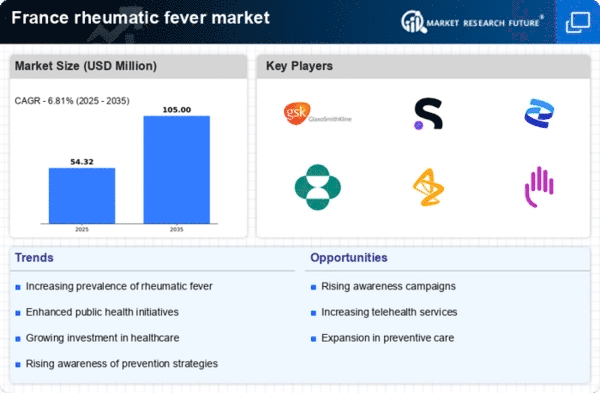Government Initiatives and Funding
Government initiatives aimed at combating rheumatic fever are significantly influencing the rheumatic fever market in France. The French government has implemented various programs to enhance public health infrastructure and improve access to healthcare services. These initiatives often include funding for research, awareness campaigns, and vaccination programs targeting streptococcal infections. For instance, the allocation of €10 million for rheumatic fever prevention programs in recent years has demonstrated a commitment to reducing the disease's burden. Such financial support not only aids in the development of new treatment modalities but also encourages healthcare professionals to prioritize rheumatic fever in their practice. Consequently, the rheumatic fever market is expected to benefit from these proactive measures.
Rising Incidence of Rheumatic Fever
The increasing incidence of rheumatic fever in France is a critical driver for the rheumatic fever market. Recent data indicates that the prevalence of rheumatic fever has been on the rise, particularly among children aged 5 to 15 years. This trend is attributed to factors such as inadequate access to healthcare and the persistence of streptococcal infections. As the number of cases grows, there is a corresponding demand for effective treatment options and preventive measures. The rheumatic fever market is likely to expand as healthcare providers and policymakers focus on addressing this public health concern. Increased funding for research and awareness campaigns may further bolster the market. Stakeholders seek to mitigate the impact of this disease on the population.
Increased Focus on Preventive Healthcare
The growing emphasis on preventive healthcare is a notable driver for the rheumatic fever market. In France, healthcare policies are increasingly prioritizing prevention strategies to reduce the incidence of diseases, including rheumatic fever. This shift is reflected in the promotion of public health campaigns aimed at educating the population about the importance of early treatment for streptococcal infections. Additionally, the integration of preventive measures into routine healthcare practices is likely to enhance the overall management of rheumatic fever. As awareness of the disease increases, the demand for preventive solutions, such as prophylactic antibiotics, may rise, thereby positively impacting the rheumatic fever market.
Technological Advancements in Diagnostics
Technological advancements in diagnostic tools are reshaping the rheumatic fever market. Innovations such as rapid antigen detection tests and molecular diagnostics have improved the accuracy and speed of diagnosing streptococcal infections, which are precursors to rheumatic fever. The introduction of these technologies has the potential to enhance early detection and treatment, thereby reducing the incidence of rheumatic fever. In France, the adoption of these advanced diagnostic methods is likely to increase, driven by healthcare providers' need for efficient and reliable solutions. As a result, the rheumatic fever market may experience growth as more patients receive timely interventions, ultimately leading to better health outcomes.
Collaboration Between Healthcare Stakeholders
Collaboration among various healthcare stakeholders is emerging as a vital driver for the rheumatic fever market. In France, partnerships between government agencies, healthcare providers, and non-profit organizations are fostering a more coordinated approach to tackling rheumatic fever. These collaborations often focus on sharing resources, knowledge, and best practices to improve patient care and outcomes. For instance, joint initiatives aimed at enhancing access to treatment and education about rheumatic fever are likely to yield positive results. As these stakeholders work together, the rheumatic fever market may benefit from increased investment in research and development, leading to innovative solutions and improved healthcare delivery.
















